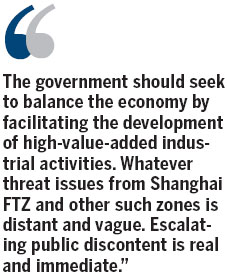Forget Shanghai FTZ: HK's problems stem from imbalanced economy
Updated: 2013-09-24 07:07
By Hong Liang(HK Edition)
|
|||||||
Property tycoon Li Ka-shing's prediction that the Shanghai free trade zone (FTZ) will have a "big impact" on Hong Kong has been widely reported by the mainland media apparently because that's what people there like to hear. Li said that Hong Kong needs to accelerate its pace of development or risk lagging behind.
Many business leaders and economists in Hong Kong have sounded similar warnings before. But none of them, including Li, have come up with any specific ideas other than calling for Hong Kong people to pull together to face the supposed challenge.
Li urged Hong Kong people to unite to improve the city instead of rocking the boat, like those participants in the "Occupy Central" movement, which Li said, "will adversely affect Hong Kong's image as a financial city and have a negative impact on the city's economy."
Of course, he and other business leaders who share an innate disdain for public protests have a point. But nobody, including the government, seems to know how to convince those "rebels" what they are doing is damaging the Hong Kong economy at a time when the wealth gap continues to widen and fewer people can afford to own their homes. The economy, so it seems, is not doing many people a lot of good.
Despite all the ballyhoo, Shanghai FTZ has remained nothing more than a vague concept. Without any detail about the project, it's impossible at this time to gauge its potential "impact" on the local economy.
The mainland media has likened the importance of the FTZ to the establishment of Shenzhen Special Economic Zone in May 1980, which, as many Hong Kong people can recall, had in its nascent stages, raised much concern about the hollowing out of Hong Kong's industry which was at that time the city's lifeblood.
As it turned out, the exodus of low-cost, labor-intensive manufacturing activities to Shenzhen was a boon to Hong Kong, extending its competitiveness in overseas markets and affording it the capital and time to make the transition into a higher-value-added service-based economy. Instead of surging unemployment, as some business people had expected, the resulting boom in the services sector absorbed the majority of the displaced factory workers who were adroit enough to adapt to the change.

But the imbalanced nature of that transition created a new set of problems manifest most contentiously in the widening wealth gap. Rising costs, especially those of property, are seen to be systematically wiping out the middle class, which has found incomes falling woefully behind.
Most of Hong Kong's business leaders belong to the privileged class under the present economic order. Understandably, they are keener than anyone to preserve the status quo and are easily annoyed by protesters calling for change, sometimes publicly.
But the privileged few must understand that economic growth is worthwhile and sustainable only when the wealth it brings is seen to be shared fairly and equitably among all. Purists argue that in a market-oriented economy such as Hong Kong, the government neither has the means nor the obligation to influence the distribution of wealth. But they are wrong, because the Hong Kong economy is not purely market-oriented, as its property sector is virtually monopolized by an oligarchy consisting of no more than five developers.
The most pressing problems facing Hong Kong are not posed by challenges from Shanghai FTZ or other mainland cities. They stem from an imbalanced economy relying almost exclusively on the financial and property sectors to generate wealth.
The government should seek to balance the economy by facilitating the development of high-value-added industrial activities. Whatever threat issues from Shanghai FTZ and other such zones is distant and vague. Escalating public discontent is real and immediate.
If the government succeeds in setting a direction in which people believe, then the majority of them will fall in line without the use of threat.
The author is a veteran current affairs commentator.
(HK Edition 09/24/2013 page1)